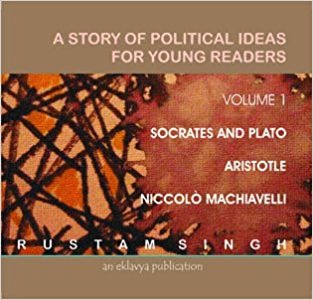A common grouse that lot of us who are students of the social sciences grew up with is the lack of interesting literature on our subject matter that are not typically academic and textbook-like. These grouses have been aired over the years, over several cups of chai at dhabas. That there are varied texts readily available for young readers (10-16 age group) on the physical and biological sciences, which make learning fun, and concepts easily understood. This is not a common feature for the Social Sciences, at least in Indian publishing. When I picked up A Story of Political Ideas for Young Readers I was pleased to see an attempt being made in this direction: that even the most abstract, complex and obscure ideas can be communicated to young readers through an interesting narrative.
The book is appealing for myriad reasons. The style of writing is accessible. The narrative is built through conversations that the philosophers in question (Socrates, Plato, Aristotle and Machiavelli) have with their contemporaries. It helps in laying out the nuances of how political ideas about statehood and the ideal society, justice and fairness evolved in the minds of each of these men. Singh also contextualizes his narrative sufficiently well for a young reader who might not otherwise have come across the history of ideas. There is enough grounding to understand the kind of societies that existed in Athens and later in Florence, which provided a matrix for these ideas to arise. Enough care has been taken to present a complex picture of how these ideas were received: Who dissented against these ideas? What was the nature of the dissent? How did dissent lend to these ideas being re-thought and acquiring a certain nuance that comes through discussion and argument?

